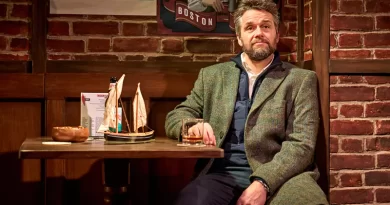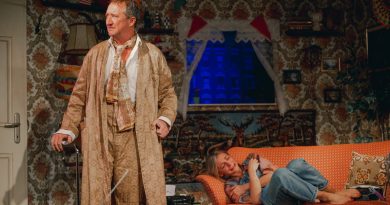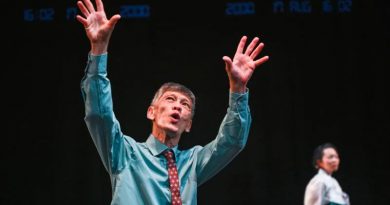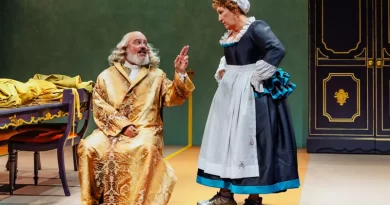Mohammad Reza Aliakbari in Tehran
1 September 2019
I am immediately surrounded by mystical, seemly unearthly sounds that make me feel suspended in space when I enter the auditorium of Iranshahr Theatre in the heart of Tehran. My body is penetrated by these alien sounds, and in such an atmosphere I feel no connection to anyone else present and imagine they feel no connection to me; I accept that I am obliged to watch the theatre production in solitude. This initial feeling of existential alienation continues – and, in fact, increases in intensity – all the way through to the end of Menagerie (Bagh-e-Vahsh), written by Faraz Mahdian Dehkordi.
In the dim light of the hall, I see only a handful of people looking for their seats. I am surprised to see such a small audience. Last year I attended a performance of Very Red Haired Anne Shirley by the same actors. That was based on the well-known fiction Anne of Green Gables which in the hands of this young group transformed into an elaborate narration that turned into a horror show. Although the group was quite unknown, I remember that the work was well received. But now I ask myself what are they doing in this commercial theatre where the usual audience is on the lookout for celebrities and big names? I know this theatre group is not interested in glamour. I hope the small number of spectators in a hall where empty seats are clearly seen won’t make the actors disappointed.
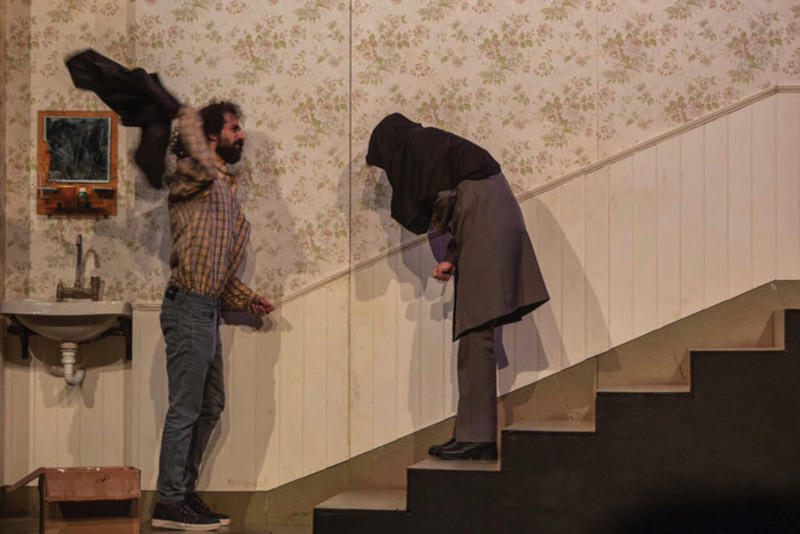
Sayyed Mahdi Hesam-al-Zakerin and Arezoo Abdelahi in Menagerie.
Photo credit: Mehdi Ashna.
The lighting goes out in the auditorium, and the darkness in addition to the strange sound effects makes me uneasy. When the stage is lit, I see that there are two figures standing far apart on a staircase in front of us. Their position and scenic imbalance amplify the anxiety I am feeling. They are a woman and a young girl dressed in the special obligatory uniform all females wear in Iranian schools. Their costumes and their gestures represent for us the all-too-familiar images of “discipline and punish” of the superior and the inferior.
The stage shows a part of an indoor staircase in some place somewhere. On the downstairs landing we see an old sink in an alcove with a dirty broken mirror above it. There is a lamp giving off feeble light. It seems there is no one to take charge of this place and keep it clean. Although the stage leads me to think the setting is a public place like a school, the wallpaper that covers the wall makes me realize that this staircase is in the interior of a house. The dialogue commences, and it turns out that an assistant principal is questioning a pupil about a quarrel she had with another pupil that resulted in her punching the other student. Although I’ve heard that the behaviour of school staff vis-a-vis their charges has improved a lot since I was a schoolboy some 20 years ago, the relationship between these two people, their intonation and their words, remind me of frightening moments during my own school years.
And all of a sudden, I am surprised to find out that the characters I am watching are a mother and a daughter who perchance attend the same schooI. The staircase is indeed in their own home and not in a school. Because they sometimes go behind a wall, I now also understand that there are two main spaces of importance in the play — the acting space on the stairs, and a hidden area which we know about only through hearing what happens there. These two spaces create a dialectic of presence and absence that is tangible in the complicated storyline and is highlighted during obscure dialogues between these characters. There is little clarity and honesty between them.
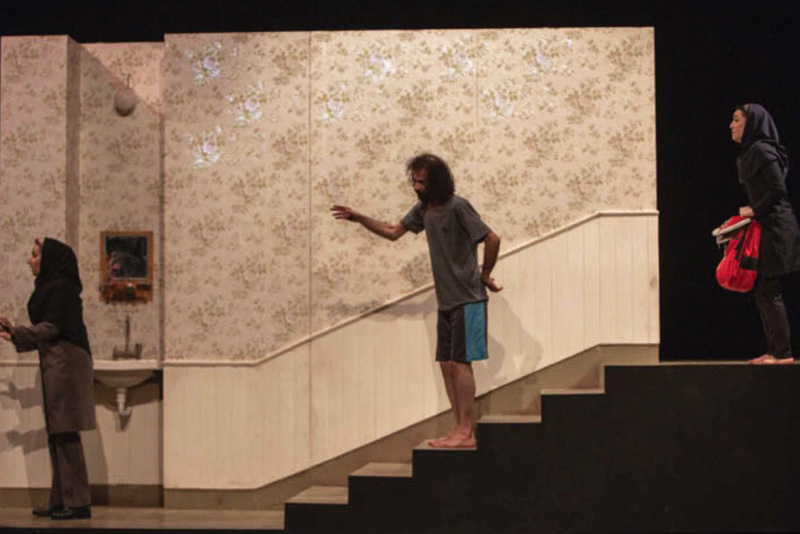
Arezoo Abdelahi and Sayyed Mahdi Hesam-al-Zakerin in Menagerie.
Photo credit: Mehdi Ashna.
Significantly, Amirbehavar Akbarpour Dehkordi, the director and also the scene designer, has put on stage an interior space that is usually overlooked. Staircases are passageways – they are places where one has no other intention than to pass through to get somewhere else, and for that reason the staircase itself is not noticed. In such spaces people don’t linger, because they are restricted and uncomfortable. Therefore, conversations in such places are usually short and to the point. At the same time, staircases are good places to talk briefly about secrets. And so I now understand that the actors’ behaviour and fragmented speeches and the fact that on stage the sink is broken and the stairs are run-down, is intended to mirror the Iranian state. Nobody has chosen to assume responsibility for this stairwell and the conversations on it are a confusing mixture between imaginary events, past events, and the present. The scenic image and the action are intended to remind us of the Iranian state which is broken at this moment. There is no will to solve problems; nobody, not even the country’s leaders, thinks of having deep conversions and addressing the problems at hand.
When the character who appears to be the husband and father, Nader (Sayyed Mahdi Hesam-al-Zakerin), comes on stage, another conflict surfaces – this time having to do with the family: father, mother and daughter. The tension between Nader and the mother Negar (Arezoo Abdelahil) grows in intensity. In order to visualize and embody this tension, the director Amirbehavar Akbarpour Dehkordi uses the stairs dramatically. In this chaotic scene, the characters go up and down, rapidly replacing each others position on any one rung. The storyline loses its linearity. The dialogue and action is a mixture of their past and current lives. The speeches refer to the power relations inside a three-member family. Gradually the audience understands that Nader is acting that he is not the real father. He is only playing the role of father of the family for the night of the girl Samira’s birthday ceremony because the real father left wife and daughter some years ago.
Faraz Mahdian Dehkordi and Amirbehavar Akbarpour Dehkordi collaborated closely to develop this play, as they did before when developing Very Red Haired Anne Shirley. In order to give some kind of structure to all the fragmented lines the characters say to each other, they used the technique of a play in a play. The girl Samira, (Maedeh Rafiei), is writing a play to be put on in school, and she is rehearsing with Nader who is a movie enthusiast and president of a video club; he imitates characters in films and enjoys playing the role of the joker. Therefore, the performance creates a double storyline simultaneously. One of these is that the three are a small family of mother, daughter, and father, and the other storyline is the rehearsal of the play in which there is a mother, a daughter, and a fake father. They overlap, and the confluence between these two representations results in family and power relations being challenged.
In a final scene of Menagerie, the three re-enact their past experiences as a family. In it, Nader decides to leave the family and Negar obstinately refuses to accept this. ln this final scene, the audience finds out that what motivates Nader’s departure is that Negar repeatedly taunts him by saying that he is not important to her or their daughter. Nader starts to beat Negar at this point in the play. As soon as this act of violence happens, the border between representation and reality is crossed. As audience, we are shocked by what we are witnessing — it feels as if the blows happening on stage are landing directly on our own bodies. Negar’s hysterical cry as she cowers beside the dirty sink and the broken mirror seems to open a deep wound that will never heal.
Menagerie is a despairing play which reflects the strains in present-day Iran. lt is a creative art work that is rooted in our country’s social problems and has developed a new performance aesthetic to distil them into art. The actors have been directed to be measured and economical with their movements. The ensemble acting and their stylized acting methods indicate that the actors have gone through a long rehearsal period. Sayyed Mahdi Hesam-al-Zakerin especially elevates his acting to an art akin to dance. His movements are mathematically precise, and yet he is light on his feet and moves delicately on stage. His control over his body and voice is exceptional among the young actors of his generation.
When l compare this new production with their previous one, Amirbehavar Akbarpour Dehkordi has clearly taken a step forward in terms of making theatre out of his present social and artistic concerns. It is ironic that this young group is using the commercial theatre as a performance site, since it does not coincide with their apparently pure artistic motivations. They are taking Menagerie to the Fajr International Theater Festival, the largest and most important theatre festival in the country which is in honour of the Islamic revolution in lran in 1979 and about which l have written previously for Plays International Europe. This year the festival is facing political challenges like never before. Many of the selected and invited theatre companies and foreign invited participants are not coming. Eugenio Barba announced that Odin Teatret would not attend the festival to show their respects to the victims of the Ukrainian International Airlines flight from Tehran to Kiev. Others are refusing to attend in light of the bloody events of last autumn in lran involving the government’s harsh repression of protests as well as the shooting down of the commercial airplane. Menagerie will be an important contribution because of its implicit criticism of power struggles that are dividing Iranian society.
This past autumn, during that discouraging period of oppression when the government shut down the lnternet and l couldn’t prepare my usual article for this publication, I had a look at my previous writings for Plays International & Europe. I saw that my articles trace the flow of social and political ups and downs. ln effect, it is becoming increasingly more difficult to stage theatre in Iran whether or not the plays attempt to reflect the dreadful political and social upheavals of the present time. At this point, and in light of the Coronavirus epidemic that has affected Tehran badly, I have no idea what I will be reporting on in the summer of 2020.



